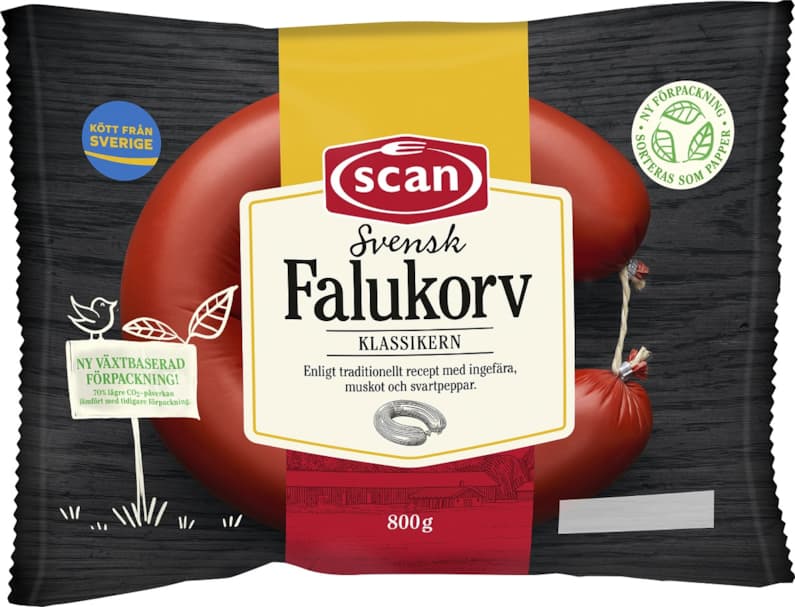A classic on Swedish dinner tables, the Falukorv 800g sausage is Scan’s best-selling product. The impact of its packaging on the climate has now been reduced by 70%, the equivalent of 207 tonnes CO2e per year. This improvement is therefore going to make a real difference. The new packaging comprises 100% renewable material and marks a step on HKScan’s journey toward its long-term climate target; achieve carbon neutrality throughout the farm-to-consumer value chain by the end of 2040 at the latest. The new packaging has been in store since the beginning of January.
Every year Scan produces approximately 8,000,000 Falukorv sausages for Swedish households. According to the Food Report 2020* Falukorv sausage stroganoff is number 7 on the list of the most common meals eaten by Swedes every day, with a 3.9% share. The packaging of such a classic therefore plays an important role for the climate. The new packaging comprises 100% renewable materials; mostly paper originating from Nordic forests and bio-based renewable plastic on the inside. The packaging goes in paper recycling.
This is the impact of the change in packaging:
• Scan uses approximately 22 tonnes less plastic per year.
• A 70%** reduction in the impact of the packaging on the climate compared with the old packaging, which was made from non-renawable plastic.
• The equivalent of 207 tonnes CO2e*** fewer emissions per year.
“Falukorv is by far our best seller and is a much cherished classic. Being able to offer packaging that has a lower climate impact for this product makes a real difference due to its high production and sales volumes. This represents an important step on our journey toward achieving our climate targets for 2040,” says Robert Lundgren, Acting VP Marketing & Categories at HKScan Sweden.
HKScan aiming at carbon-neutral food production
The HKScan Group, which includes the brand Scan, aims to make own industrial production carbon-neutral by the end of 2025 and to achieve carbon neutrality throughout the farm-to-consumer value chain by the end of 2040 at the latest. Product packaging that is more climate-smart plays an important role in these targets. All of HKScan’s packages will be recyclable by 2025.
Read more about HKScan's packaging strategy
*Source Food & Friends Matrapport 2020 (Food Report 2020)
**Measured by IVL Swedish Environmental Research Institute
***Carbon dioxide equivalents





